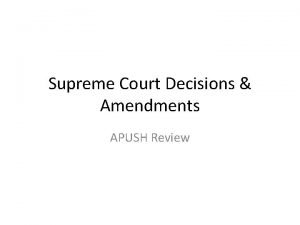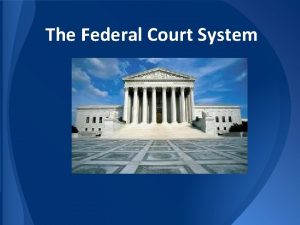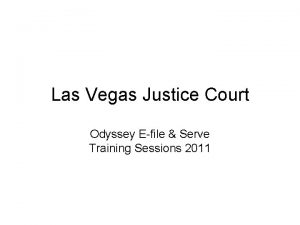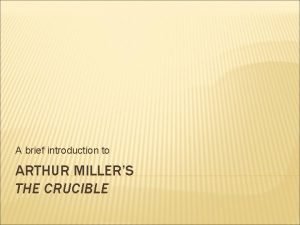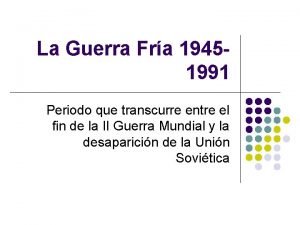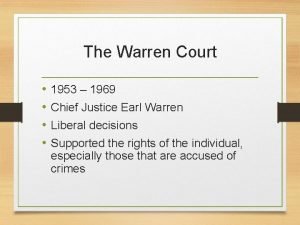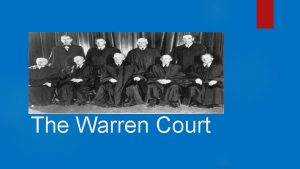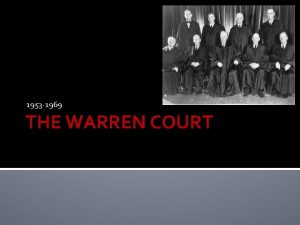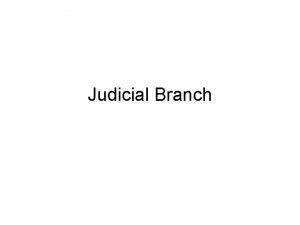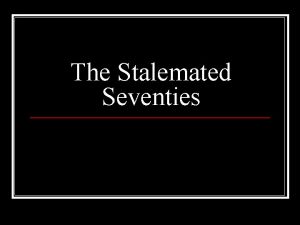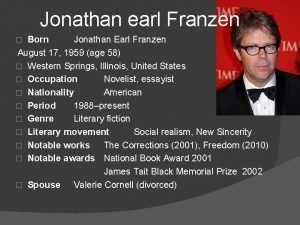The Warren Court Earl Warren Chief Justice 1953










- Slides: 10

The Warren Court

Earl Warren • Chief Justice (1953 -1969) • Saw American law as a the way to promote equality • Protector of the Bill of Rights • One of his first cases – Brown v. Board of Education (1954)

Mapp v. Ohio (1961) ü Mapp’s home was searched without warrant and she went to jail ü Enforces 4 th Amendment (unreasonable search and seizure) Police believed that Mapp was harboring a suspected bomber, and demanded entry. No suspect was found in her apartment, but police discovered illegal gambling slips, a pistol, and a trunk of obscene pictures in Mapp's basement.

Engle v. Vitale (1962) Ø Public schools forced students to say prayers Ø Court ruled Ø This violated 1 st amendment – freedom of religion A New York State law required public schools to open each day with the Pledge of Allegiance and a nondenominational prayer in which the students recognized their dependence upon God. The law allowed students to absent themselves from this activity if they found it objectionable.

Abington School District v. Schempp (1963) • Edward Schempp challenged a state (Pa. ) law that required public school children to read the Bible (1928 law stated that at least 10 verses had to be read at the beginning of the day) • Court Ruled • 1928 law was unconstitutional – violation of 1 st amendment

Gideon v. Wainwright (1963) ● Gideon could not afford a lawyer so he defended himself and lost ● Court ruled: ● ● All people have the right to a lawyer no matter how much money they make Enforces 5 th and 6 th Amendment Gideon was charged with breaking and entering with the intent to commit a misdemeanor, which is a felony under Florida law. At trial, Gideon appeared in court without an attorney. In open court, he asked the judge to appoint counsel for him because he could not afford an attorney. The trial judge denied Gideon’s request because Florida law only permitted appointment of counsel for poor defendants charged with capital offenses.

Miranda v. Arizona (1966) ● ● ● Man was NOT told he had the right to remain silent or a lawyer Established Miranda Rights that had to be read before trials 5 th and 6 th Amendments Miranda was found guilty of kidnapping and rape and was sentenced to 20 -30 years imprisonment on each count. On appeal, the Supreme Court of Arizona held that Miranda’s constitutional rights were not violated in obtaining the confession.

Loving v. Virginia (1967) • Richard Loving (white) married a colored woman (Mildred) • Arrested and jailed for 1 year for violation of Virginia’s anti-miscegenation laws • Result: • Court unanimously banned all interracial marriage laws

In Re Gault (1967) • • Juvenile was not given due process rights in trial; questioned without parents; forced confession Court ruled: • • Gives juveniles the same due process rights as adults 5 th Amendment (Due process of law) Gerald (“Jerry”) Gault was a 15 year-old accused of making an obscene telephone call to a neighbor, Mrs. Cook, on June 8, 1964. After Mrs. Cook filed a complaint, Gault and a friend, Ronald Lewis, were arrested and taken to the Children’s Detention Home.

Tinker v. Des Moines (1969) Ø Tinker wore armbands to protest Vietnam and got suspended Ø Court ruled: Ø Upheld freedom of symbolic speech in schools
 Lesson 3 commander in chief and chief diplomat
Lesson 3 commander in chief and chief diplomat Apush supreme court cases
Apush supreme court cases What duty was mary warren performing in the court?
What duty was mary warren performing in the court? Is there a basketball court above the supreme court
Is there a basketball court above the supreme court Supreme court justice system
Supreme court justice system Las vegas justice court efile
Las vegas justice court efile War of the worlds 1953
War of the worlds 1953 Anne triesman
Anne triesman Harry truman doris day
Harry truman doris day Arthur millers drama fra 1953
Arthur millers drama fra 1953 La maxima tension 1947 y 1953
La maxima tension 1947 y 1953

